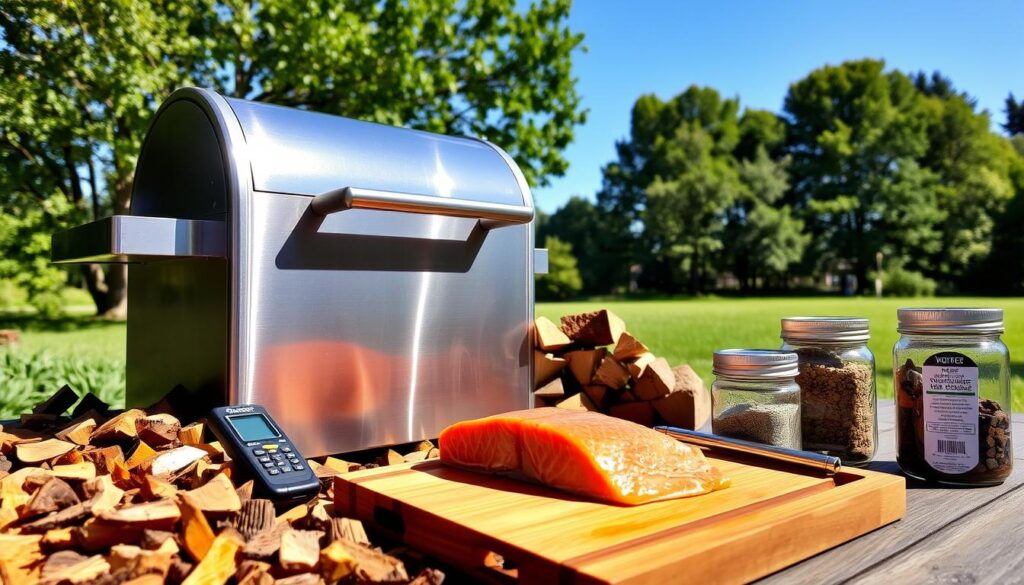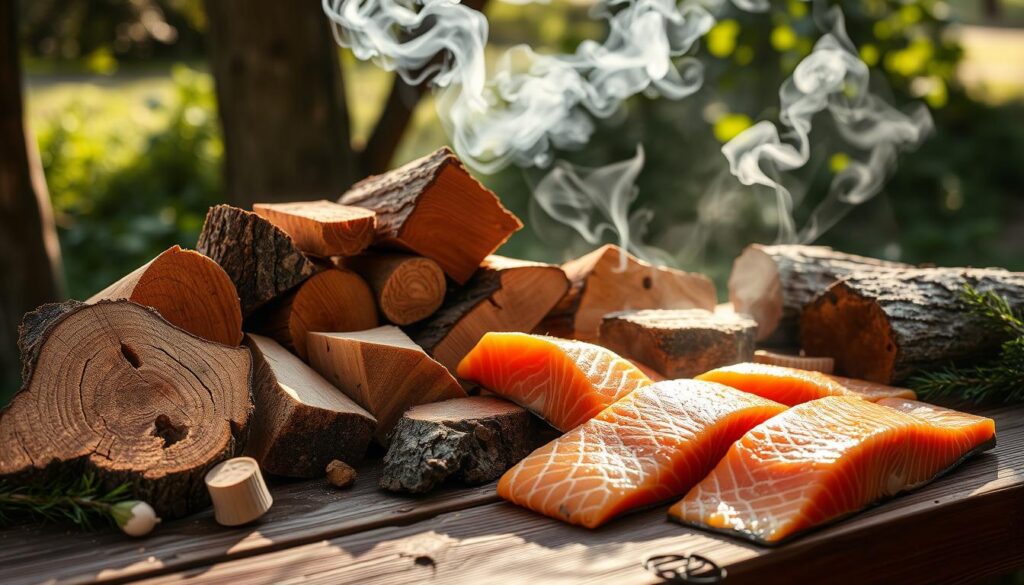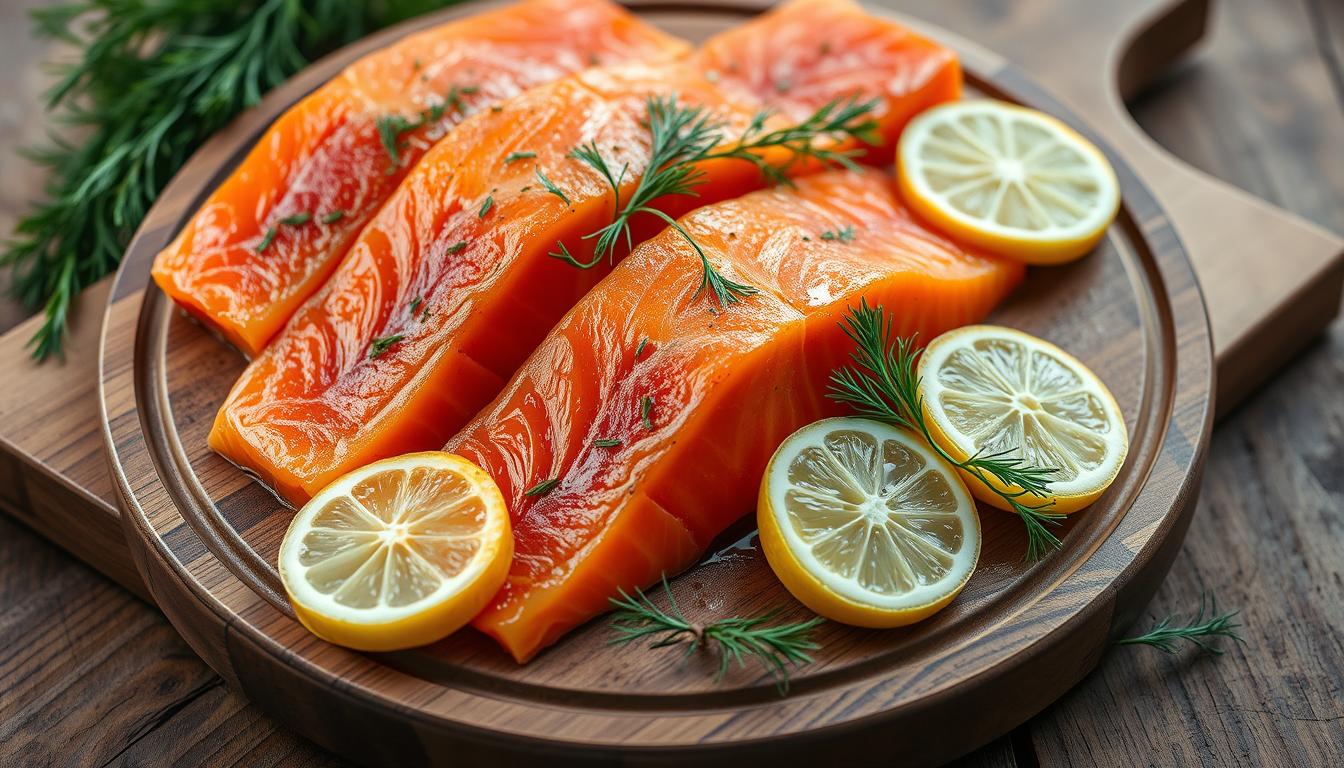How to Smoke Salmon: Step-by-Step Guide for Beginners
The smell of smoked salmon in the kitchen makes everyone hungry. I’ve learned how to smoke salmon at home and I’m eager to teach you. It’s simple to turn regular salmon into a fancy dish that tastes amazing.
In this guide, I’ll show you how to smoke salmon perfectly. It doesn’t matter if you’re new to smoking or have done it before. You’ll learn how to make your salmon taste great, feel right, and stay moist. Soon, you’ll be making smoked salmon that will wow your loved ones!
Table of Contents
How to Smoke Salmon
Introduction to Hot-Smoked Salmon
Hot-smoked salmon is a tasty treat with a unique taste and texture. It’s different from cold-smoked salmon because it’s cooked in the smoker. This makes it tender, flaky, and smoky. You can make this gourmet dish at home easily.
What is Hot-Smoked Salmon?
Hot-smoked salmon is smoked at a high temperature, around 400°F (200°C). It’s cooked until it reaches 145°F (63°C inside). This makes it firm and flaky with a strong smoky taste. It’s often cured with salt, sugar, and spices before smoking, making it even tastier.
Benefits of Hot-Smoking Salmon at Home
- Delicious, gourmet-quality salmon with a tender, flaky texture and a delicate smoky flavor
- Versatile and easy to incorporate into a variety of dishes, from salads to pasta to sandwiches
- Nutritious and high in protein, with the added benefits of the smoking process
- Ability to control the ingredients and smoking process for a personalized flavor profile
- Cost-effective compared to purchasing pre-smoked salmon from specialty stores
Hot-smoked salmon is a great way to improve your cooking skills. It lets you enjoy a tasty, high-quality protein at home. With some practice, you can make a delicious hot-smoked salmon that will wow your loved ones.
“Hot-smoked salmon is a true delicacy, with a flavor and texture that can’t be matched by any other type of smoked salmon. The process of hot-smoking really brings out the natural richness of the salmon, creating an unforgettable dining experience.”
Choosing the Right Salmon
When smoking salmon, the quality and type you pick really matters. Whether it’s wild-caught or farm-raised, picking the right salmon is key for the best taste.
Wild Salmon vs. Farm-Raised Salmon
Wild salmon and farm-raised salmon both have their own perks for smoking. Wild salmon, like king and sockeye, has strong flavors and a firm texture. It’s lean and full of nutrients, but can dry out if not watched closely. Farm-raised Atlantic salmon has more fat, making it stay moist and tasty during smoking.
Best Salmon Varieties for Smoking
- Wild king (Chinook) salmon: This top choice has lots of fat and a rich, buttery taste.
- Farm-raised Atlantic salmon: It’s easy to find and affordable, with great fat marbling for smoking.
- Wild sockeye salmon: Though leaner, sockeye can still be smoked well, but needs careful watching to avoid drying.
It’s important to choose high-quality, fresh salmon, no matter the type. This ensures the best taste when you smoke it at home.
“The flavor and texture of cured salmon are shaped by the curing process, ranging from lightly salty to intensely brined.”
Brining the Salmon
Brining the salmon is a key step. It seasons the fish deeply and makes it firmer. This prevents it from drying out while smoking. A simple wet brine of salt, brown sugar, and spices is essential for great smoked salmon.
Why Brine Salmon Before Smoking?
Brining the salmon before smoking has many benefits:
- Enhanced Flavor: The brine gives the salmon a savory taste that spreads throughout.
- Improved Texture: It keeps the salmon moist, making it tender and juicy.
- Firmer Consistency: Brining makes the salmon denser, helping it handle the smoking process better.
| Brine Ingredients | Quantity |
|---|---|
| Salt | 1/2 cup |
| Brown Sugar | 1/2 cup |
| White Sugar | 1/2 cup |
| Lemon Pepper | 1/4 cup |
| Crab and Shrimp Seasoning | 1 package |
| Garlic, minced | 4 cloves |
| Lemons, sliced | 4 |
| Oranges, sliced | 2 |
| Lime, sliced | 1 |
| Yellow Onion, sliced | 1 large |
| Water | 32-64 oz (1/4 – 1/2 gallon) |
To make the brine, mix all the ingredients in a big container. Stir until the salt and sugars dissolve. Then, put the salmon fillets in the brine and chill for 1-2 hours. This step makes your smoked salmon flavorful, moist, and perfectly textured.
Preparing the Smoker
To make perfect hot-smoked salmon, start by setting up your smoker right. Heat it to 225°F for indirect heat. This temperature is great for hot-smoking salmon, cooking it through while adding a light smoky taste.
For keeping the salmon moist, put a water-filled drip pan inside. This pan keeps the air humid, stopping the salmon from drying out. For the best taste, use alder wood chips or pellets. Alder wood gives a soft, slightly sweet smokiness that goes well with the salmon’s natural flavor.
- Preheat the smoker to 225°F for indirect heat cooking
- Use a water-filled drip pan to maintain humidity
- Opt for alder wood chips or pellets for a delicate smoky flavor
With the right smoker setup, you’re on your way to making delicious hot-smoked salmon. It’s sure to impress your loved ones.

Smoking the Salmon
To get the best smoked salmon, keep the temperature and time right. Aim for a smoking temperature of 225°F (107°C). This helps the salmon cook evenly without drying out or getting too smoky.
The smoking time is usually 30 to 60 minutes, based on the salmon’s thickness. Use a probe thermometer to check the salmon’s internal temperature. The goal is 140°F (60°C). Take the salmon out a few degrees before it hits this mark to avoid overcooking.
Checking Doneness with a Probe Thermometer
A probe thermometer is the best tool for checking smoked salmon. Stick the probe into the thickest part of the salmon, avoiding bones and skin. Watch the temperature closely and remove the salmon when it’s a few degrees shy of 140°F (60°C).
Remember, the salmon will keep cooking a bit after it’s out of the smoker. So, it’s crucial to take it off the heat at the right time. With some practice, you’ll get that delicious, flaky, and perfectly cooked smoked salmon every time.
“Smoking salmon at the ideal temperature and time is the key to achieving that perfect texture and flavor.”
The Best Wood for Smoking Salmon
Choosing the right wood for smoking salmon is key to a great flavor. Alder wood is the top pick, giving a light, sweet smoky taste. This taste complements the fish’s natural flavor perfectly.
Alder wood comes from the Pacific Northwest, a great match for wild salmon from the same area. Apple or cherry wood are also good, adding a milder smoke. Avoid strong woods like mesquite or hickory, as they can overpower the salmon.
| Wood Type | Flavor Profile | Recommended Use |
|---|---|---|
| Alder | Delicate, slightly sweet | Ideal for smoking best wood for smoking salmon |
| Apple | Subtle sweetness | Great for wood chips for smoking salmon |
| Maple | Mild, with a touch of sweetness | Suitable for shorter smoking sessions |
| Pecan | Nutty, medium-intensity smoke | Can impact cooking time, use with caution |
| Peach | Subtle, sweet, and floral | Excellent for enhancing natural salmon flavors |
For wood chips for smoking salmon, choose dry chips over wet ones. Dry chips burn cleaner and smoke more evenly. Try mixing different woods for unique flavors. Keep the temperature between 225°F and 275°F for the best results.

“Alder wood is the quintessential choice for smoking salmon, offering a delicate and slightly sweet smoky flavor that truly enhances the natural taste of the fish.”
Preventing Albumin on Smoked Salmon
Albumin, a white, chalky substance, can show up on cooked salmon. It’s a common problem for home smokers. But, with a few simple steps, you can avoid it and enjoy perfect smoked salmon every time.
Wet brining the salmon before smoking is a great method. Soak the fillets in saltwater for 15 minutes to an hour. This breaks down the muscle fibers on the outside, stopping too much albumin from coming out during smoking. Remember, albumin is in all salmon, whether it’s farmed or wild.
Letting the salmon develop a pellicle is also key. This sticky surface forms as the fish dries out. It helps the smoke stick to the salmon, improving both taste and look. Make sure to let the salmon sit uncovered in the fridge for at least 1-2 hours before smoking.
Keeping the smoking temperature low, around 180°F, also helps. This slow cooking lets the salmon release its juices without pushing out too much albumin.
If albumin still shows up on your smoked salmon, don’t worry. You can easily remove it with a knife or fork. By following these steps, you’ll always have beautifully smoked salmon without albumin.
Serving and Storing Smoked Salmon
Once your smoked salmon is ready, you can enjoy it in many ways. It’s perfect as a topping for bagels, creamy pasta, scrambled eggs, and even salmon tacos. For a fancy look, serve it on a platter with crackers, cream cheese, capers, and fresh herbs.
Serving Suggestions
Smoked salmon goes well with creamy and tangy flavors like cream cheese and crème fraîche. It also pairs well with fresh, bright tastes like lemon, capers, and chives. Try it in main dishes like salmon-topped rice bowls or pasta salads. For a cool pairing, serve it with a crisp, dry white wine like Gewürztraminer or Riesling.
Storing and Reheating Instructions
To store your smoked salmon, wrap it tightly in plastic wrap or use an airtight container. Keep it in the fridge for up to 4 days. For longer storage, freeze it in vacuum-sealed bags or zip-top freezer bags for up to 6 months. To reheat, thaw it in the fridge and then gently warm it in a 300°F oven. Drizzle with olive oil and wrap in foil until warm.

